Catholic News Around Indiana
Compiled by Brandon A. Evans
Diocese of Evansville
Young People Learn - And Serve - At Confirmation Spectacular
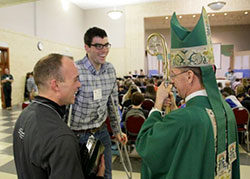 By Tim Lilley
By Tim Lilley
After arriving at St. Joseph Parish in Jasper and signing in for the 2016 Confirmation Spectacular the 250 young people who attended the Feb. 6 event moved to the Kundek Hall gymnasium and helped each other assemble goody bags of snacks for distribution to the needy. Hundreds of bags came together quickly, and the service project amplified something Bishop Charles C. Thompson talked about later during the Confirmation Spectacular Mass – two elements of the day that he found wonderful.
“… one is your willingness to be open in mind and heart to receive because we can’t give away what we don’t have,” he said. “And then you must have the courage, humility and generosity to give.
“The whole purpose of being confirmed and entering into full membership of the Church … is to embrace the mission of Jesus,” he added. “How we embrace the mission of Christ is what it’s all about for us.”
Throughout the afternoon, the young people attended small-group presentations on discipleship and the gifts of the Holy Spirit from religious and laity who serve across the diocese. Seminarian Tyler Tenbarge, who will be ordained to the priesthood in June, led a final combined session on Confirmation itself.
As an overview, Tenbarge offered Paragraph No. 1302 from the Catechism of the Catholic Church: “It is evident from its celebration that the effect of the sacrament of Confirmation is the special outpouring of the Holy Spirit as once granted to the apostles on the day of Pentecost.”
“It’s often the silent witness of your life that’s the most powerful,” Tenbarge said. “Christ came that we might have life to the full. He came to cover up that chasm that separates us from him.
“In confirmation, that becomes full,” he added, “you’re fully initiated into Christ. All that he asks is that you open yourself to him and say Yes Lord, show me the way … even if I don’t want to know the way; make me want to know the way.”
“You came here today with a sense of openness,” Bishop Thompson told the young people during Mass. “And God just needs a little (opening) to make all the difference in our lives. So I pray that you have the grace to be open and continue to receive, and that you take what you receive and be willing to share with others.”
Photo caption: Bishop Charles C. Thompson shares a light moment with Diocese of Evansville seminarians Tyler Tenbarge, left and Garrett Braun before the 2016 Confirmation Spectacular's closing Mass. The Message photo by Tim Lilley.
'Catholic Schools Are Wonderful Places'
By Tim Lilley
Bishop Charles C. Thompson summed up the spirit – and message – of Catholic Schools Week across the Diocese of Evansville with the statement that serves as this story’s headline. “Catholic schools are wonderful places,” he said.
Rivet High School in Vincennes hosted the 2016 Catholic Schools Week Mass, celebrated Feb. 3 at St. Benedict Cathedral in Evansville. Students and teachers from all 26 Catholic schools across our 12 counties attended, and priests from parishes with Catholic schools concelebrated with Bishop Thompson.
“Just think,” Bishop Thompson said, “if the whole world would be like a Catholic school … how much better the world would be.”
He began by suggesting that the day’s readings – for the Feast of St. Blaise - may seem “a little bizarre” for the Catholic Schools Week Mass. “But they remind us where we truly fine peace and happiness,” he said. “Today’s readings remind us if we’re not doing the will of God, we’re always going to fall short.”
He noted that the Gospel reading, Mark 6: 1-6, describes how “people wanted the Messiah on their own terms, not on God’s terms. If we’re trying to impose our will instead of embracing God’s will, we’re never going to find true peace and happiness.
“Our Catholic schools exist as ministries of our Church and our parishes to do what all the other ministries and services of our Church exist to do … that is to seek to discern and plant the will of God in our hearts,” Bishop Thompson continued.
He noted the Extraordinary Jubilee of Mercy impacts the celebration of Catholic Schools Week this year. “Pope Francis has asked us to spend this year focusing on how we can follow the teaching of Jesus Christ, and Jesus tells us that we are to go out and treat each other as we would treat Him … (and) as we would want to be treated.
“The faith and the knowledge that you’re receiving through your Catholic school education hopefully will lead you to recognize how to serve those in need,” Bishop Thompson said. “How do we use our gifts and talents – our knowledge – and put our faith in action to serve those in need?
“As we celebrate this week, let us celebrate the gift of faith. Let us celebrate the gift of knowledge. Let us pray for the grace that we will, as Pope Francis reminds us, embrace this call to perform the spiritual works of mercy; to reach out to others and allow our Catholic education not only to make a difference in (your) life, but through (you) make a difference in the lives of others.”
(For news from the Diocese of Evansville, log on to the website of The Message at www.themessageonline.org)
Diocese of Fort Wayne-South Bend
Turnstone offers unique services to persons with disabilities
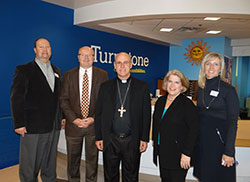 By Kay Cozad
By Kay Cozad
FORT WAYNE — As the Catholic Church and the Fort Wayne community at large work to serve those with physical and other disabilities, a unique mission is taking place with just that work in mind. Turnstone, a nonprofit organization, provides a comprehensive network of services for people with disabilities. What makes this agency unique anywhere across the U.S., is that it “fundamentally provides services from cradle to grave,” said Turnstone CEO Mike Mushett. Turnstone, established in 1943 by a group of parents of children unable to attend area schools due to their disabilities, currently provides an Early Learning Center with an integrated day care education program that helps children with and without disabilities develop skill sets and interpersonal skills needed to adjust to kindergarten. The facility also provides an adult day program now serving approximately 90 individuals five days a week that offers a combination of social, recreational and respite activities.
Turnstone offers speech, physical, occupational and aquatic therapies and both the early learning and adult programs provide individuals with the opportunity to receive any therapies needed. Turnstone also provides a team of pediatric and adult social workers who ensure each individual receives the services they need. Support groups, including one for parents, Parkinson’s sufferers and amputee walking schools, are also part of the services there. “It’s a holistic approach,” said Mushett, “to both the individual with the disability, but just as importantly their family as well.”
The Plassman Athletic Center, a newly constructed $14 million 125,000 square foot athletic facility was opened on Sept. 15, 2015, and includes a health and wellness fitness center with meeting rooms and all equipment accessible to all disabilities, designed with space between the equipment to allow for wheelchair mobility. A large warm water aquatic therapy pool, 230-meter running track, group fitness rooms and NCAA dimension basketball courts are also highlights of the facility.
Turnstone sponsors seven competitive sports teams including three wheelchair basketball teams, two power soccer teams, and sled hockey. It has hosted countless basketball and sled hockey tournaments and will host the power soccer national championship in June.
Mushett who has overseen the facility for over a year said, “I am amazed everyday with the things that I see and experience. We are very blessed that it’s a very mission-driven organization. We are providing our educational and therapy health and wellness and sport and recreation programs to empower people with disabilities. The people that work here are really focused on that as a mission and it’s a very committed staff.”
Photo caption: Bishop Kevin C. Rhoades toured Turnstone, a unique non-profit organization that serves individuals with physical and other disabilities, in Fort Wayne on Jan. 7. Shown from left are Dave Springmann, Turnstone Chief Financial Officer; Mike Mushett, Turnstone CEO; Bishop Rhoades; Meg Distler, CEO of St. Joe Community Health Foundation; and Ruth Stone, Turnstone Chief Development Officer.
(For news from the Diocese of Fort Wayne-South Bend, log on to the website of Today’s Catholic at www.todayscatholicnews.org)
Diocese of Gary
Year of Mercy a historical route to God, says priest
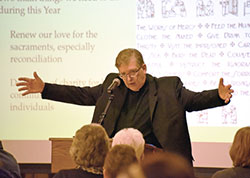 By Anthony D. Alonzo
By Anthony D. Alonzo
SCHERERVILLE—Most practicing Catholics know the Year of Mercy is upon us. Yet the history of such a designation and, more importantly, what it means to the believer have many of the faithful looking to get up-to-speed.
Providing a historical perspective and reading from the recent words of Pope Francis, Father Martin Dobrzynski, pastor of St. Michael the Archangel, told dozens of faithful gathered at the Schererville church on Jan. 21 for a presentation about the Year of Mercy that there is a powerful simplicity to the jubilee.
The jubilee is designed to bring Christians closer to God.
“God intends us to be with him, that’s the intention God has,” Father Dobrzynski said, referencing Pope Francis’ remarks.
Father Dobrzynski continued “a Jubilee Year such as this is a way of making that really plain and clear to us.”
From Pope Boniface VIII’s convoking a Holy Year in 1300 with his bull "Antiquorum Habet Fida Relation" (For a Perpetual Remembrance of the Thing), to St. Pope John Paul II’s Great Jubilee for the year 2000 announced in his Apostolic Letter “Tertio Millennio Adveniente” (As the Third Millennium Approaches), the Holy Fathers generally declared jubilees at 25-, 33-, or 50-year intervals.
The year-long events hold the promise of “great remissions and indulgences for sins,” with the conditions including sincere contrition and a pilgrimage to Rome and to “the venerable basilica of the prince of the apostles,” or St. Peter’s Basilica. (For the current jubilee, local dioceses can designate pilgrimage churches, and other events.)
“There is some record of jubilee years in the Old Testament,” Father Dobrzynski said of the Jewish tradition. “In the Church that notion was not picked up immediately.”
So what is the significance of 2015-2016 that it should be designated as an Extraordinary Jubilee of Mercy?
Though there is no ecumenical council occurring and the years are not numerically significant, Father Dobrzynski said the year and its moto, “Merciful Like the Father” (Luke 6:36), is timely as it counters the “calamity” of today’s world.
Father Dobrzynski referenced the new book “The Name of God Is Mercy,” which was compiled from an interview Pope Francis completed with Italian journalist Andrea Tornielli. The Schererville priest also cited “Misericordiae Vultus”, the bull announcing the Holy Year of Mercy.
“Jesus Christ is the face of God’s mercy – that’s the first line, that’s the theme,” Father Dobrzynski said about Misericordiae Vultus.
Father Dobrzynski prefaced the main part of his talk suggesting that “being good Catholics, we always have a lot of “stuff” packed into small sentences.” So he paused and then said he would focus simply on the word ‘Jesus,’ “the one who came in the flesh – not some dusty myth… it is an historical event.”
Photo caption: Father Martin Dobrzynski, pastor of St. Michael the Archangel Church, gives a presentation about the basis for and benefits of The Year of Mercy at the Schererville church on Jan. 21. (Anthony D. Alonzo photo)
(For news from the Diocese of Gary, log on to the website of the Northwest Indiana Catholic at www.nwicatholic.com)
Diocese of Lafayette
West Lafayette pastor among ‘missionaries of mercy’
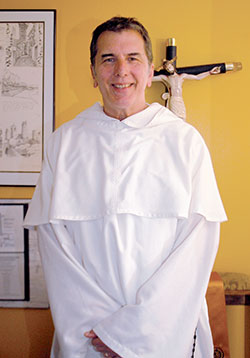 By Kevin Cullen
By Kevin Cullen
WEST LAFAYETTE — Father Patrick Baikauskas, OP, is among the “missionaries of mercy” from around the world who are in Rome this week to receive a special mandate from Pope Francis.
They were selected by the pope to preach and teach about God’s mercy during the Year of Mercy. Each priest has been granted special authority to pardon sins that carry penalties that only the Holy See can lift.
“I don’t feel that I am worthy, but I pray I can live up to the expectations of our Church,” said Father Baikauskas.
A Dominican priest and pastor at St. Thomas Aquinas Church on the Purdue University campus, he stresses reconciliation, and so does Pope Francis.
In recent years, hours of confession have been extended at St. Thomas Aquinas Church. Confessions are heard daily, and approximately 150 confessions are heard there weekly.
Those who fear the sacrament should know that “God’s love and mercy are greater than we possibly can imagine,” Father Baikauskas said. “What I hope every single person experiences is relief from all the things that are burdening them. That is what God wants, and that is what we want.
“When they walk out, they walk out as they were baptized,” he said. “What a great gift that is. I wonder, sometimes, why people aren’t lined up around the block.”
Seven hundred “missionaries of mercy” were to meet the pope on Feb. 9, and again at a special ceremony and concelebrated Mass on Ash Wednesday in St. Peter’s Basilica. The event was organized by the Pontifical Council for Promoting New Evangelization.
Being chosen is “an extraordinarily humbling experience” and an unexpected honor, Father Baikauskas said. His nomination was accompanied by a letter of support from his religious superior.
“When I first heard about it, I thought it would be a wonderful thing in recognition of what we have done to promote the sacrament of reconciliation,” he told parishioners, “… but I truly had no idea that I would be one of a mere 125 (from) the United States.”
The Holy Year runs until Nov. 20. At a news conference at the Vatican on Jan. 29, Archbishop Rino Risichella, president of the Pontifical Council for Promoting New Evangelization, said that a huge number of priests and religious men applied to serve as special missionaries. They received permission from their bishops or superiors.
Only 800 were to be chosen, but the total was expanded to 1,071. They will serve in their own dioceses, but they may be invited by other bishops to visit other dioceses, too, according to a Catholic News Service report.
Photo caption: Father Patrick Baikauskas, OP, is among the “missionaries of mercy” from around the world who received a special mandate from Pope Francis.
‘Slavery still exists in our own backyard’
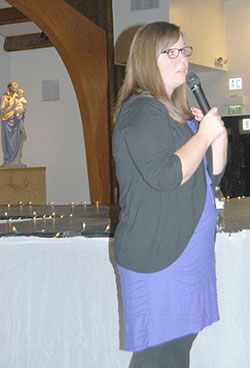 By Kevin Cullen
By Kevin Cullen
CARMEL — If you think human slavery ended 150 years ago, think again.
Each day, thousands of girls in the United States are “sold” for sex. They are pawns in the sex trade, an industry fed by abuse, poverty, homelessness, drug addiction, social media ... and pimps who exploit them.
“Our mission is to tell people that slavery still exists. It exists in our own backyard,” says Jessica Evans,
executive director of Purchased, an Indianapolis-based non-profit that provides education on human trafficking and programs for victims and potential victims. “… I want people to rise up and take ownership.”
She spoke to a crowd of approximately 100 at Our Lady of Mt. Carmel School on Jan. 30. The talk was followed by a style show sponsored by the Center for Global Impact. Lisieux Society members served as models. Handmade apparel was sold to support women at risk.
“This is a very important issue for all of us,” said Shannon Wenninger, a member of the parish Gospel of Life committee.
She noted that Catholic Relief Services, which provides social services in more than 100 countries, offers programs for victims of human trafficking and sexual slavery.
But Evans focused primarily on sexual slavery in the United States, particularly in Indiana. After hearing her, Wenninger said, “I feel angry, and shocked, and wanting to do something.”
Evans, a 2003 Indiana Wesleyan University graduate, was an Indianapolis school teacher when she went on a mission trip to Nepal in 2007. There, she was appalled to find children engaged in the sex trade. She met several of them.
Those girls left a mark on her heart. “They have value and worth, like everyone else,” she said.
Back home, she learned that the United States creates much of the demand in the world’s $32-billion-a-year commercial sex trade. She also learned that most Americans are unaware of the issue.
Over time, Evans felt God calling her to raise awareness, to educate girls, and help the victims of modern-day slavery.
After hosting various educational and fund raising events, and speaking with anti-trafficking workers in Indianapolis, she left teaching and founded Purchased in 2011.
Purchased visits schools, churches and youth groups to talk about human trafficking and to reach out to potential victims. The organization also offers programs for girls from impoverished neighborhoods and youth detention centers. It is recruiting and training adults for a volunteer mentoring program scheduled to begin this year.
“Pay attention to what God might be doing in your heart,” Evans told her audience. “I challenge you to pay attention to what God might be calling you to do.”
Photo caption: Jessica Evans is the founder and executive director of Purchased, an Indianapolis-based non-profit that provides education on human trafficking and programs for victims and potential victims. (Photo by Kevin Cullen)
(For news from the Diocese of Lafayette, log on to the website of The Catholic Moment at www.thecatholicmoment.org)
 By Tim Lilley
By Tim Lilley By Kay Cozad
By Kay Cozad By Anthony D. Alonzo
By Anthony D. Alonzo By Kevin Cullen
By Kevin Cullen By Kevin Cullen
By Kevin Cullen